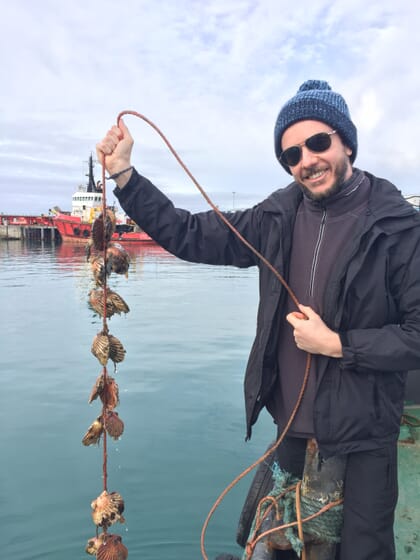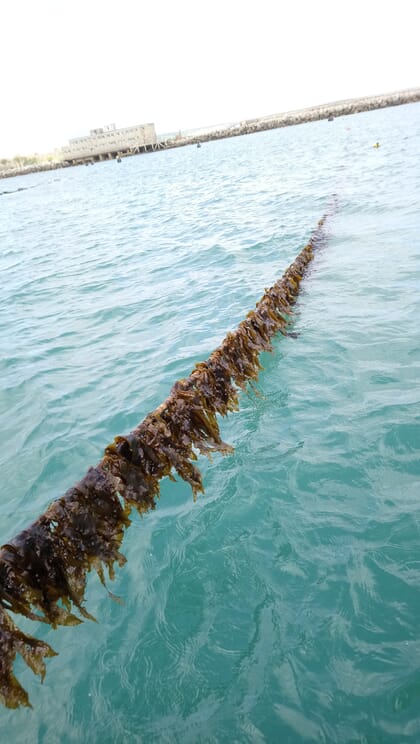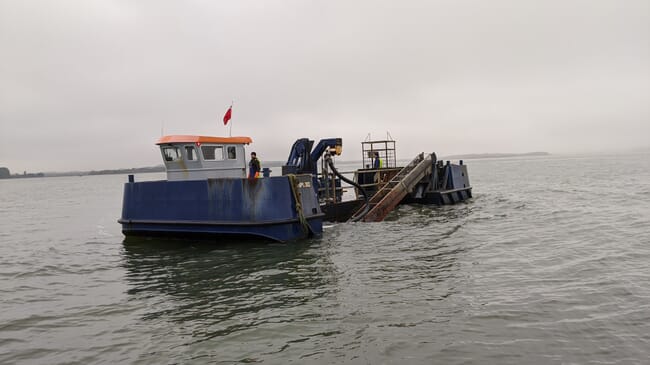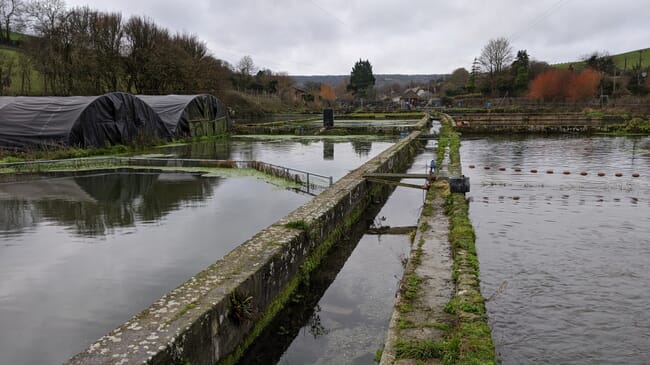
What are the most exciting established aquaculture ventures in the region?
We have a strong sector here in Dorset and it’s diverse too. Currently we have producers who farm trout, artic char, seaweeds, oysters, clams, mussels, lumpfish… the list goes on. Houghton Springs Fish Farm is pushing genetic work with trout to the next level. Hans Hoff, the owner, has been doing great work in selective breeding and genetic analysis, developing a strain of trout that is more resilient to common diseases associated with trout production.
I must mention Jurassic Seafarms. The company was formed in 2018 and established a small-scale seaweed farm with help from funding through the FLAG. Since then, they’ve gone from trialling seaweeds to pioneering IMTA on the south coast of England, with the inclusion of bivalve shellfish alongside the seaweed lines.
They are now involved in some cutting-edge trials with the 5G Rural Dorset project exploring how 5G can be used to help monitor the farm and environmental conditions there. The project is also looking to install AI-assisted underwater cameras to monitor seaweed growth and biofouling of lantern nets and lines and it’s hoped that all this tech will be mounted on buoys made from flax fibre – a world first – making them biodegradable and helping to keep plastics out of the marine environment.

© Jurassic Sea Farms
We have the largest producer of Pacific oysters in England, in Poole Harbour. Othniel Oysters grow oysters on the seabed in the harbour and have been working to develop new and novel depuration techniques to help with issues such as norovirus, which can cause intermittent closures of the shellfish beds in Poole. This is a real issue for their livelihood and so we’re looking at ways we might be able to help in the short and long-term.
Are there any startups coming through in the region?
I can’t say too much, but we have recently had a new business register in Dorset. The company will be developing a RAS project for a new, novel species never grown in the UK on a commercial basis. There’s a long way to go but it’s very encouraging and we hope the project will create a number of skilled jobs in the sector here.
I’ve had so many conversations this past year with people looking to start seaweed cultivation, but licensing can sometimes be tricky for some businesses and I see it as a bit of a barrier to development. I know Defra are starting to look at the processes for aquaculture licensing, but until that policy change takes place, businesses need all the support they can get to help navigate the application process. I also have conversations around aquaculture technology start-ups, which is often overlooked. It may seem obvious, but if you want to develop a thriving, sustainable aquaculture sector, you need the support industries around that such as boat servicing, water pump companies, mooring specialists or life support system technology. Some of those companies already exist here but it’s encouraging that new companies are looking to establish in Dorset to help support industry as it grows.
Can you tell me a bit about your own involvement in the Dorset and Devon aquaculture sector?
I started working for Dorset Coast Forum in 2017 at a time the local FLAG [Fisheries Local Area Group] had five priorities, one of which was to strengthen the aquaculture sector in the county. The FLAG supported seven aquaculture projects – ranging from long-line farming infrastructure for a seaweed start-up and revamping an existing oyster farm to sending local stakeholders to the Scottish seaweed conference.
The FLAG closed in March 2020, and following the success of having an aquaculture development officer trial project, we submitted a successful project to the Maritime and Fisheries Fund (MFF) to continue my role as development officer across both fisheries and aquaculture, with backing from Dorset Council and the Dorset Local Enterprise Partnership.
So, it’s been a combination of the work of the FLAG, the award of the HPO from DIT, the political buy-in from Dorset Council and the Dorset Local Enterprise Partnership and the acceptance from industry that this was the right time to do this.
One year down the line, what has been achieved?
The South West Aquaculture Network (SWAN), which I chair, has grown to almost 100 members in the last year. The network aims to develop cross-sector, collaborative bids to draw down significant fund to benefit the blue economy in Southwest England.
I’ve been working with the local agricultural college, Kingston Maurward, to develop a new Marine Aquaculture Level 2 and 3 course, focusing on the needs of the sector in Dorset. The course is launching in September 2021 and will offer young people and people looking to develop their career the opportunity to study and gain work experience in the type of aquaculture that already exists here and what is likely to develop in the future.
How do you plan to build on the success of the work so far?
The next steps are really to develop two key initiatives identified in the Dorset Mariculture Strategy – an Aquaculture Innovation Centre and Aquaculture Parks. The idea behind parks is to remove some of the problems with getting licences in place for different aquaculture production.
Imagine an area of sea with all relevant licensing, permissions and environmental assessments carried out which allows new businesses or existing aquaculture producers to trial new technology, new species or innovative moorings without the need to acquire new licenses for every trial. We can see how this could work from the Poole Several Order, which the Southern IFCA manage but I truly think this sort of initiative could reduce commercial risk, unlock an increase in sustainable production and increase the number of businesses in the sector across England. The Innovation Centre has been outlined in the English Aquaculture Strategy as a critical need to develop the sector, we’ve done a lot of work here already about how that could work in reality and how it could help the sector in Dorset, the South West and across England.
I also think developing projects to help improve opportunities for shellfish production in English waters will be key. Whether that’s through improving water quality on existing beds through mitigation type projects – like reed beds for example, or by looking at different options for how shellfish beds are assessed for water quality, changes are needed to enable an expansion in production and give the sector confidence in supply chains.

© Othneil Oysters and Martin Sutcliffe
Have you had to work hard on improving the social licence of the sector?
The main thing we’ve had to work on is distinguishing the English sector from the Scottish sector, as they are very different. If you speak with most members of the public and ask them about aquaculture the first thing that comes to their mind is salmon and probably justifiably so – I don’t need to tell you how successful the Scottish salmon is - but the coast here is not really suited to finfish cages, and it’s much more likely that seaweed and bivalve molluscs will dominate – at least in the marine environment – probably accompanied by RAS production of high value species, such as yellowtail kingfish.
I think the fact that seaweed is a bit of a buzzword among environmental campaigners at the moment has done some of the work for us and now that we’ve managed to set the distinction between the English and Scottish sector, there’s a lot of positivity around the sector. There’s always more work to be done however and by continuing to talk with stakeholders and communities across the region, we can ensure that the differences between the English and Scottish sectors are made more apparent to the general public and that some of the potential benefits of aquaculture, such as carbon sequestration and other ecosystem services, can be championed to allow the sector to develop in a holistic, sustainable way.
How have investors responded to the work?
We’ve had enquires from all over the world from investors looking to invest in Dorset’s sector. It’s still early days and I spend a lot of time explaining the opportunities specific to Dorset as a lot of investors, like I said earlier, presume finfish cages are the way forward, but once they understand that isn’t the case, they often say “OK, so what can I develop that fits with Dorset’s assets?”. It’s a two-way thing, but having someone they can talk to, alongside my colleagues in Dorset Council and at Dorset Local Enterprise Partnership, makes all the difference. Being able to have those early conversations, manage expectations and work with investors to tailor their plans for Dorset helps them understand what is possible here rather than trying to fit a square peg into a round hole!
How are you helping shellfish producers cope with Brexit-related export issues?
The Brexit-related issues have particularly hit live bivalve exporters hard in the region as well as some of the wild capture sector too. I’ve been meeting with local MPs to raise the issues directly with them, highlighting the impact and loss of profits the change in the UK’s status to a Third Country has had on local business. I’ve also been there for people to talk to. It’s often overlooked, but just having someone who can just listen sometimes makes a massive difference. I always try and help where I can by connecting people, looking at funding or making others aware of the issues. With the rapidly changing funding landscape at the moment too, I try to signpost businesses to support wherever I can, helping with or checking over funding applications and liaising with the MMO or other funding bodies.
I’ve been working on developing a report focused on inshore water quality in Dorset and how that could be addressed to help remove some of the Brexit-associated problems around live bivalve exports. Dorset Coast Forum already works very closely with the local water company on a range of projects, particularly Litter Free Coast and Sea. This means I have been able to link with that work to look at the development of holistic options that might help alleviate some of the inshore water quality issues affecting shellfish beds in Dorset. It’s the first step on what is likely to be a long road, but we have the right people around the table, including the shellfish growers, and we hope we can work some projects out that will benefit production of shellfish in the future.
Where would you like to see the region’s aquaculture sector to be in 10 years’ time?
I’d really like to see a sector that is thriving and more diverse than today, but one that works in conjunction with the wild capture sector – and other marine users for that matter. We’ve got a large number of under-10m boats in Dorset and, understandably, many fishermen I speak with are concerned about the development of large-scale aquaculture in the marine environment. But, if we look at some of the work the University of Plymouth has been doing with Offshore Shellfish in the ROPE and SPILLOVER projects, there is evidence to suggest that aquaculture infrastructure can benefit wild capture fisheries.

© Houghton Springs Fish Farm
So, with careful planning, using tools like the Cefas spatial mapping tool on the Dorset Aquaculture website, and through aquaculture businesses talking with fishermen I believe that development of aquaculture in Dorset and across the southwest could benefit both sectors.
There’s an opportunity to develop small-to-medium-scale RAS production in Dorset. If we can develop sustainable, green power systems, farms could be set up nearby towns and provide them with locally-grown, sustainable protein and at the same time reduce food miles and emissions of greenhouse gases associated with food production. I’d also like to see an innovative sector in Dorset. I’ve said throughout that the English sector will be very different to the Scottish, and I see that there is an opportunity to develop new cultivation techniques and species that fit to the English coast and that are likely to be able to adapt to the changing climate in the future.




